


dok.incubator
 |
A film blog by Allan Berg Nielsen & Tue Steen Müller



A film blog by Allan Berg Nielsen & Tue Steen Müller
 |
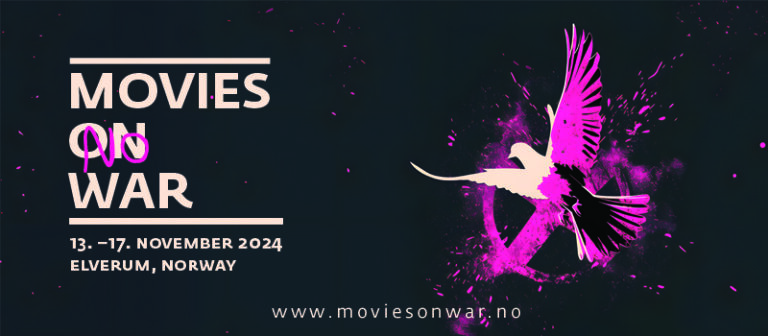
I have copy-pasted from Modern Times Review this intro to a festival in my neighboring country Norway – a festival that starts today and lasts until November 17 with an impressive collection of films (alas!) that deals with conflicts and wars in the world we live in:
“Movies on War is a film festival devoted to films about war and conflict, peace and reconciliation. The films we screen in our programs cover the full range of armed conflicts, regardless of geography, and provide insights into social movements, cultural events, popular uprisings, and political change, both in the past and in the present. Since the very beginning, filmmakers have used the language of the cinema for reflection on world wars and conflicts. They have worked for a better understanding of the human, political, military and social driving forces behind these conflicts, and through this contributed to the work for peace.”
The intro praises the filmmakers as you can read, and I have no reservations, when I see that films like “Hollywoodgate” by Ibrahim Nash’at is there (theme: Afghanistan) as well as the film that is all over and is a candidate to win the EFA award (theme: Israel/Palestina) “No Other land” and my favourite as film of the year Olha Zhurba’s “Songs of Slow Burning Earth” (theme: Ukraine) and Soundtrack to a Coup d’Etat by Johan Grimonprez (Congo/Patrice Lumumba) – are in the program. Not to forget the film by Askold Kurov & Anonymous 1 “Of Caravan and Dogs” that I saw in Budapest at the Verzio Festival, a strong documentation of the implementation of the “foreign agent” law in Russia that led to the closure of important opposition media in the country, having the chief editor Muratov of Novaya Gazeta leave the country among many others.
The festival takes place in Elverum 1,5 hour by car North of Oslo.
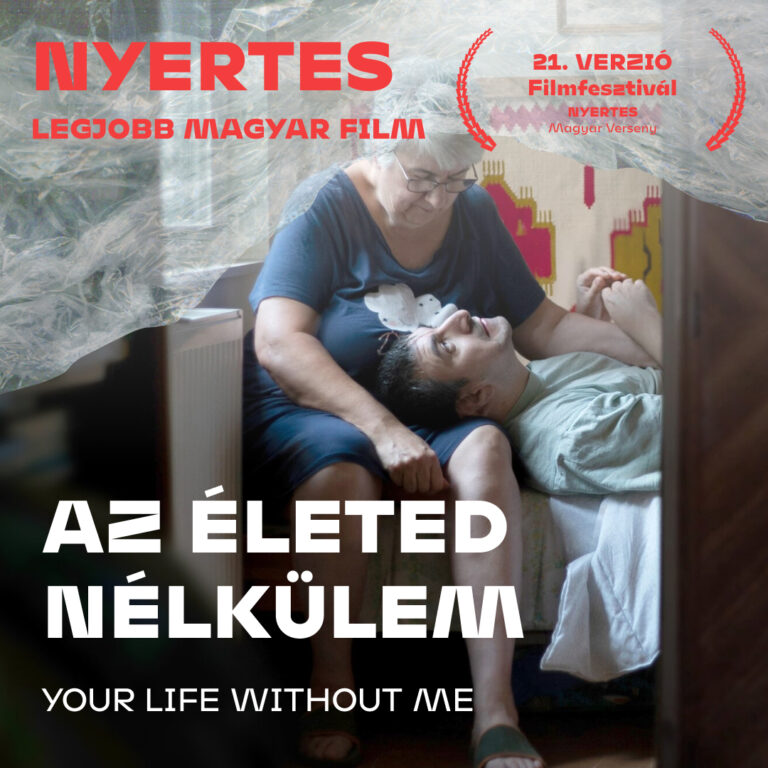
Impressions from five days in Budapest for the Verzio FF. I already – the post before this – wrote about a day with Diana Groó and Judit Hoffmann, unforgettable, so much looking forward to the film “Dear Helena” with Diana as director and Judit Hoffmann, her grandmother as the protagonist, 97 years old now, holocaust survivor.
I was there invited by festival director Enikö Gyuresko to sit in the Hungarian jury with Polish Adam (Kruk) and Slovak Eva (Krizkova). Adam and Eva! We saw 6 films, all good ones, comments to Life and Social Conditions. For the screenings there were full houses and the organizers had made time for Q&A’s, obvious as the films called for discussions. All fine and professional.
We gave the first prize to “Your Life Without Me” by Anna Rubi, which was already awarded at the Sarajevo FF and was shown in September at the Magnificent7 Festival in Belgrade. The festival directors Svetlana and Zoran Popovic wrote about the film (https://filmkommentaren.dk/anna-rubi-your-life-without-me/). Our short winner motivation at the Verzio FF went like this:
“For a film that is simultaneously engaged in social issues and is engaging the viewer’s attention – one that avoids oversimplifying family relationships in order to show, that unbreakable determination of mothers can even win against the impotency of the state, the winner is Your Life Without Me.
Our short motivation for the special mention ‘to “Kix” by Bálint Révész & Dávid Mikulán went like this:
An impressive interpretation of how social conditions over years can influence the lives of kids. For its long-lasting, honest, playful and immediate dialogue with its protagonists, in which the medium of film plays a unique and irreplaceable role, a Special Mention goes to KIX.
Some words on other awards, happy that Ukrainian Olha Zhurba was given main award for her extraordinary Songs of Slow Burning Earth that I reviewed on this site (https://filmkommentaren.dk/olha-zhurba-songs-of-slow-burning-earth/), the best documentary of 2024?, with a special mention for Balomania by Danish Sissel Morell Dargis, that film was also in Belgrade and the festival directors Svetlana and Zoran Popovic wrote about it (https://filmkommentaren.dk/sissel-morell-dargis-balomania-2/).
The Verzio website can give you the full list of winners.
It was biting cold in Budapest the last days I was there but the festival atmosphere was warm, supporting the films and their makers. There is a strong Hungarian filmmakers organization Madoke that has a website – https://madoke.hu/wp-content/uploads/2024/11/madoke_katalogus_2024_online.pdf – and the understated characterization of the state of the art goes like this:
“The art of documentary is needed more than ever in Hungary, where independent filmmakers are faced with a lack of proper funding.” It was obvious that the 6 films we watched in the jury were all funded – all of them or partly – by NGO’s and humanitarian organizations.
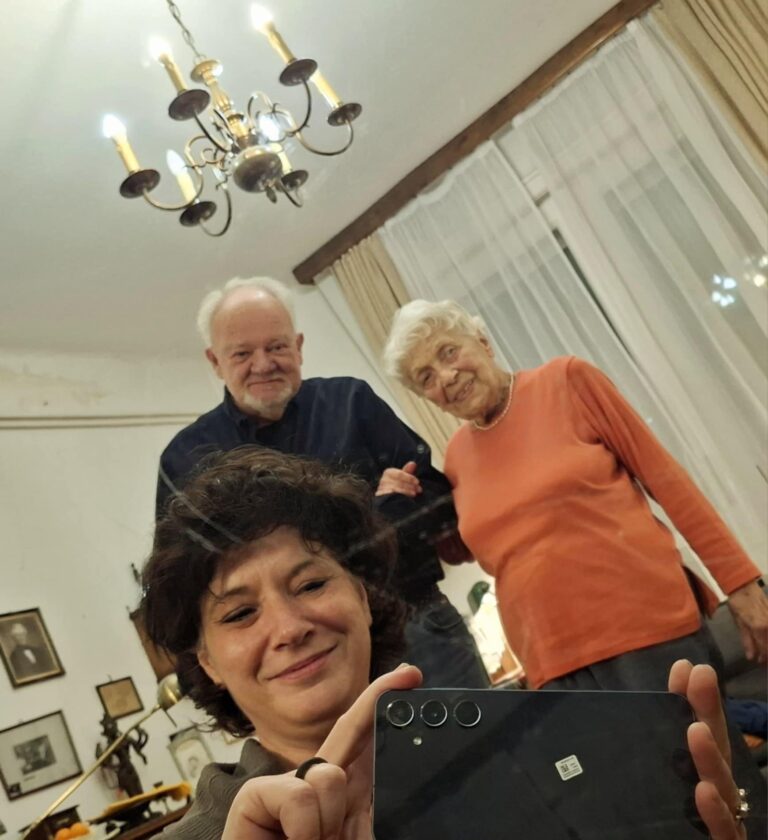
I have known Diana Groó for 25 years. We met in Denmark at the European Film College in Ebeltoft for a film event. Since then we have met in different places and she was the one, who introduced me in Budapest to Pál Schiffer, the legendary Hungarian director, who was the teacher of Diana. The filmography of Diana shows her talent for working in different genres, fiction, long and short, animation and documentary. Her film about “Regina”, the first female rabbi in the world, is based on ONE photo, amazing work that you can find on Netflix. And Diana has, of course, also worked for theatre.
Being here for the Verzio Film Festival, in the Hungarian jury, it was obvious that I had to see Diana on her home ground. She invited me to her home in the cosy neighbourhood near the Danube. Buildings from the 1930’es, Bauhaus-style as well, restaurants around the Raoul Wallenberg utca; we ended up in one called Frida, I got a ginger Palinka, never heard about that before, very tasty, a nice meal – and then to Diana’s home to watch material for the film she has been working on for years featuring her self and her grandmother… who is 97 years old, a holocaust survivor, and before coming to Budapest I kept on almost begging Diana to meet her.
The film with a quote from last year’s Verzio Doc Lab: “”Dear Helen- I am already them” is a film-letter, an experimental docu-diary, dedicated to my great-grandmother Helen, who perished in Rechlin KZ, in the arms of my grandma.”
From what I saw and heard from Diana in her cosy flat on the top of Budapest, a place she adores and names “Little Tel Aviv” as so many “modern Jews”, Diana’s expression, live there: it will be a great film about her grandma and her self.
I met Judit Hoffmann, grandma, in her apartment, close to the home of Diana. She had prepared some snacks for the visit at her place and she was completely fresh in mind during the little hour we spent together. She talked in English but we shifted to German, kein Problem for her, my German a bit more rusty. She did give me the story of her family being deported to Auschwitz in 1944, and from there to other kz camps, but that will all be in the film that her grand daughter Diana is working on. So I asked her about her life after the war and she told me what her experiences from the camps had meant for her. She had – on the horrible background – decided that no one should ever tell her what to do any longer. She married, got a child, and went into writing and taking photographs. We have a lot, Diana said, and my mother also took photos. Oh, I would love to see those photos, maybe Diana can use some of them in her film, or in another film maybe.
I am 20 years younger than grandma and of course I had to hear her tell me the secret of becoming 97… She thought a bit and told me to live life fully, enjoy it, inspire new generations. A smiling warm-hearted grandma with an unbelievable life story. Totally engaged in what happens now. Diana said that grandma was the first to tell he the dates and program of the Verzio festival!
I told Judit Hoffmann that I will come back to the premiere of the film and went for a film in the cinema, a film from today’s reality… it was not easy to concentrate after a day with Diana and her grandmother. Thank you so much!
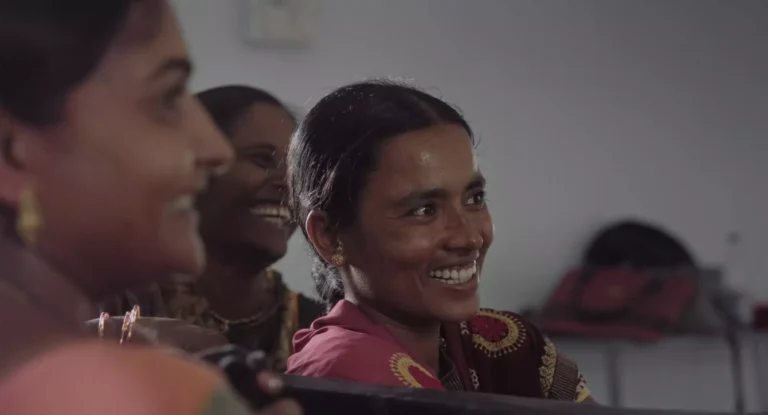
5 out of 12 films were selected for me and colleague members of the European Film Academy. I have watched them all and am still thinking, where to put my vote. And as a good schoolboy I had done my homework and watched the 12 as well. I have no objection to the 5 that are competing now and
I was happy from the 12 to watch a very different Nicolas Philibert film, “AT AVERROES & ROSA PARKS“, where the master, quoting the synopsis goes “from individual interviews to “caretaker-patient” meetings, Philibert focuses on showing a form of psychiatry that continually strives to make room for and rehabilitate the patients’ words…”, a couple of the protagonists I had met before in “On the Adamant”.
The same goes for “MARCHING IN THE DARK” (Photo) by Kinshuk Surjan from India, a very strong well told emotional film, beautiful to watch, for heart and brain. A quote from the synopsis: “Sanjivani, a young widow in rural India, grapples with devastating loss after her husband, a farmer who succumbed to the pressures of rising costs, unyielding crop failures, and volatile market prices, commits suicide – as one of thousands each year in India’s agriculture sectors. Now absorbed into her brother-in-law’s family, Sanjivani and her two children struggle to be seen and respected…” You sense the extraordinary connection of the director and Sanjivani as the film develops, it’s not so often that happens.
And one more from the 7 non-selected, “MY STOLEN PLANET“, which I loved even if I have seen so many films from Iran. Farahnaz Sharifi is the director and she uses archive material, personal and official. The director made this statement: “When we share a memory with others, it moves from private to public. This story is woven tightly with a resistance to forgetting. At a time when power structures strive to narrate history in ways that hide important and popular segments, it becomes all the more crucial to share personal details and micro-narratives.”
For one who always – in workshops also – tries to help filmmakers express themselves in a personal film language and on personal matters, I can only agree.
So now to the five, where should I put my vote: On the very personal, mother and daughter film “Bye Bye Tiberias” by Lina Soualem, On “Dahomey” by Mati Diop, a film that goes everywhere because of its passionate storytelling and the theme of colonialism, On “In Limbo” by Alina Maksimenko, a family story from Ukraine, “The documentary tells the story of my family, who suddenly finds itself in the middle of a war and is faced with dramatically difficult decisions…”, On “No Other Land” by Yuval Abraham, Rachel Szor, Basel Adra, Hamdan Ballal, a film that is very actual with its focus on the Israeli apartheid policy… I am writing this in a hotel lobby in Budapest, on the tv screen I just saw “Netanyahu congratulates Trump”, there is a lot to be depressed about these days… On “SOUNDTRACK TO A COUP D’ETAT” by Johan Grimonprez, who is the director being honoured at IDFA, a cinematic virtuoso work, “Jazz and decolonisation are entwined in this historical rollercoaster that rewrites the Cold War episode that led musicians Abbey Lincoln and Max Roach to crash the UN Security Council in protest against the murder of Congolese leader Patrice Lumumba”. And you see the performance of Khrushchev in the UN. “Krusse” we called him in my home, my mother loved him.
My mother who at some point decades ago asked me “when are you going to deal with real films…”, she meant fiction films with actors and action. I told her about my addiction to documentaries, showed her a lot and she understood, I think.
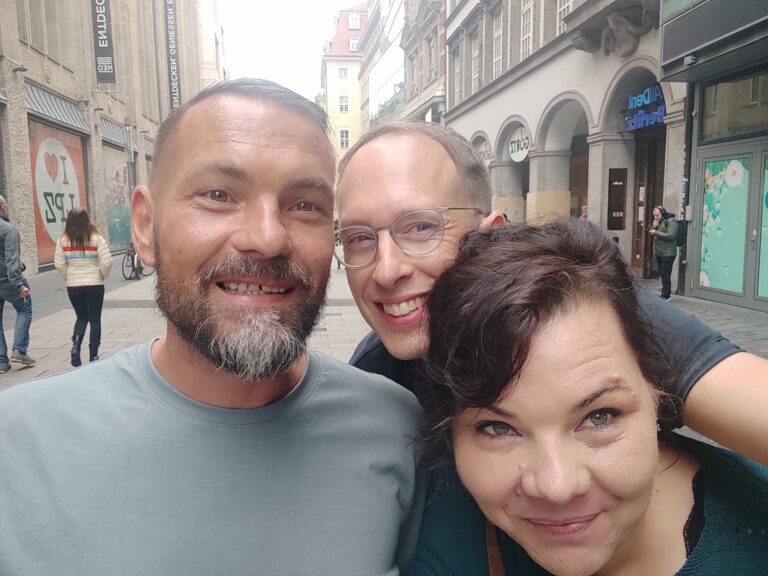
I was not in Leipzig for the festival but followed it and have written several texts about films and events. Of course having an eye on what happened for good film friends. One of them Daniel Abma with whom I have been tutoring in different countries and whose films I have been watching. 7 years ago I posted on this site a review of “Transit Havana” by Daniel: https://filmkommentaren.dk/daniel-abma-transit-havana/
Yesterday Daniel sent me a message “Tue, we won three awards” at the festival. Bravo! I asked him to send me a link and last night my wife, who has met Daniel as well on many film occasions, sat down to watch on my Macbook – and loved the film, sending our excuses to Daniel and his cameraman. As the film includes gorgeous images from the nature, meant for the big screen, around a house that rooms “eine Wohngruppe im ländlichen Raum” with a handful of kids, who lives here and is being taken care of, yes, caring adults who have stepped in the footsteps of parents, who could not cope with them at home due to social conditions, alcoholism, domestic violence whatever, universal theme. They are professional caregivers; as a viewer you gain big respect for their handling all the difficult situations. Towards the kids but also when they have phone consultations with the parents about visits in the weekend and/or about eventual sending them home.
In the press material Daniel and his helpers stress that the focus is on the caregivers, yes, but our focus was also on Kelvin, the wonderful black kid who has serious problems to control his temperament and in the film, we are told, is sent to a clinic and strapped down. A child of 10 years! Shocking for us and for the caregiver.
Daniel has shot the film over several years. He demonstrates warmth and sensitivity towards the grown-ups and the children, and a respectful protection of not only Kelvin but also Nicklas, whose parents are divorced with a discussion about, who should have custody. “You are going to stay with your father but you can always visit your mother”, says the warm and understanding Frau Wagner, a true hero, one of them in the house.
I mentioned it before – brilliant landscape images that adds perfectly to the positive angle of the film.
It will travel and it will be good for broadcast. Well done, dear Daniel.
Germany, 2024, 90 mins.
The photo is not from the film. It shows two of the protagonist and Daniel Abma behind them in connection with the premiere.
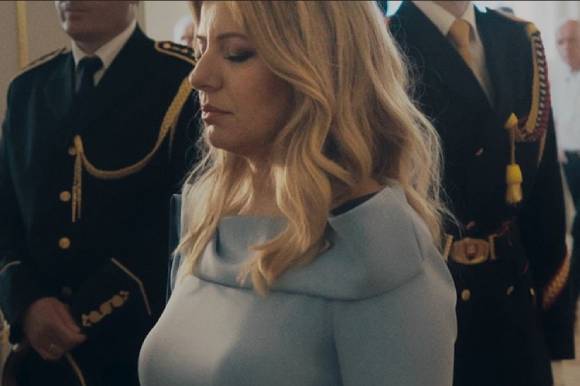
Access… is what Slovak director and cameraman Marek Šulík was given to film Zuzana Čaputová during the five years she was president of Slovakia, from 2019 till 2024. An access – with limitations of course – that included Šulík was present, when Čaputová was with advisers discussing/preparing the huge amount of speeches and official duties a president has in a country that – as neighbouring Hungary – is full of right-wing orientated political parties, escalating after the Russian full-scale invasion of Ukraine. Zuzana Čaputová is seen on her trip to Kyiv, talking to the parliament, meeting Zelenskyj and on a tour to watch the consequences of Russian bombings. Back home in Bratislava she is met with Russian orientated demonstrations.
Otherwise Čaputová walks to press conferences, holds speeches, have one-to-one conversations, asks questions to the group of people, who works for her in the Palace, talks emotionally about her family at the same time as she continues to say that she wants to protect her daughters from the public spotlight that – as the film shows – becomes more and more nasty, her being called “an agent”, “a bitch”, “an American whore” receiving death threats and so on. Writing this the day before the American election takes place – we know it, we have heard it, we hear it.
She is welcoming the Pope in sequences that are quite emotional as her father is near death, the Pope knows about that and you see him comforting her. But tears roll from her eyes. And through the whole film you get the impression of a woman – I want to stay “a quality mother” as she says in the beginning of the film – who wants the best for her country and its population and who shows positive human tolerance, for instance at a sequence that deals with the killing of two LGBT people, that gathered huge demonstrations.
At the end of the film a woman approaches Čaputová thanking her for her way of being an open and caring President, asking her to go for another term. Later she says that she does not have the strength and Šulík brings a wonderful shot of her with the daughters.
Access… like Pavel Koutecký had when he filmed Vaclav Havel for 14 years for “Citizen Havel” that was finished by Mira Janek… gave us another great film, that won the Opus Bonum at the Jihlava FF the other day.
Slovakia/Czech Republic, 2024, 110 mins.
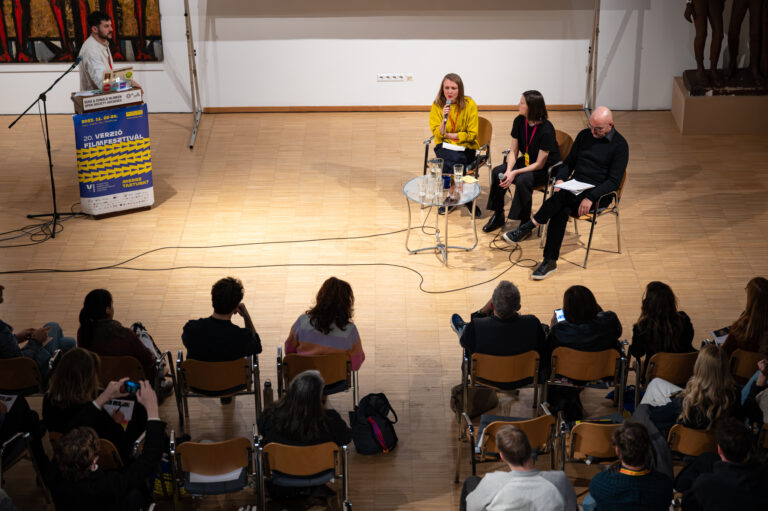
The public pitch of the 6 selected projects of the 9th Verzió DocLab workshop and pitch platform! Verzió DocLab is the only workshop and pitch platform dedicated to nurturing new voices in Hungarian documentary filmmaking and supporting filmmakers of the region and Europe. Directors, producers and editors will pitch their film projects. The creative teams will also present the scenes they have worked on with the guidance of the DocLab mentors to an industry panel and audience. The evening will be moderated by factual storytelling expert and strategist Jesper Jack (DK) and Péter Becz (HU), director and producer, creative director of Verzió DocLab. Verzió DocLab mentors are Flóra Erdélyi, editor (HU), Anna Kis, director and editor (HU) and Jesper Jack.
PITCHING FILMS AND CREATORS:
The freeSZFE Film (working title) / Hungary – representing the FreeSZFE Film Collective: Asia Dér, director and Dávid Kántor, editor
Bee In My Mouth / Hungary, Germany – Balázs Imre Lóránd, director and producer
Hide Me In The Light / Ukraine – Markiian Miroshnychenko, director; Nata Onysh, editor and Oleksandr Krasenko, producer
lluminated Geology / Spain – Pere Puigbert, director, cinematographer and editor; David Gimbernat, producer and Pol Roig, Second Camera Unit
Moving Sisters / Greece – Christos Stefanou, director; Eugenia Papageorgiou, editor and Michalis Kastanidis, producer
My Dear Vira / Ukraine – Maryna Brodovska, director and Olga Chernyk, co-director and producer
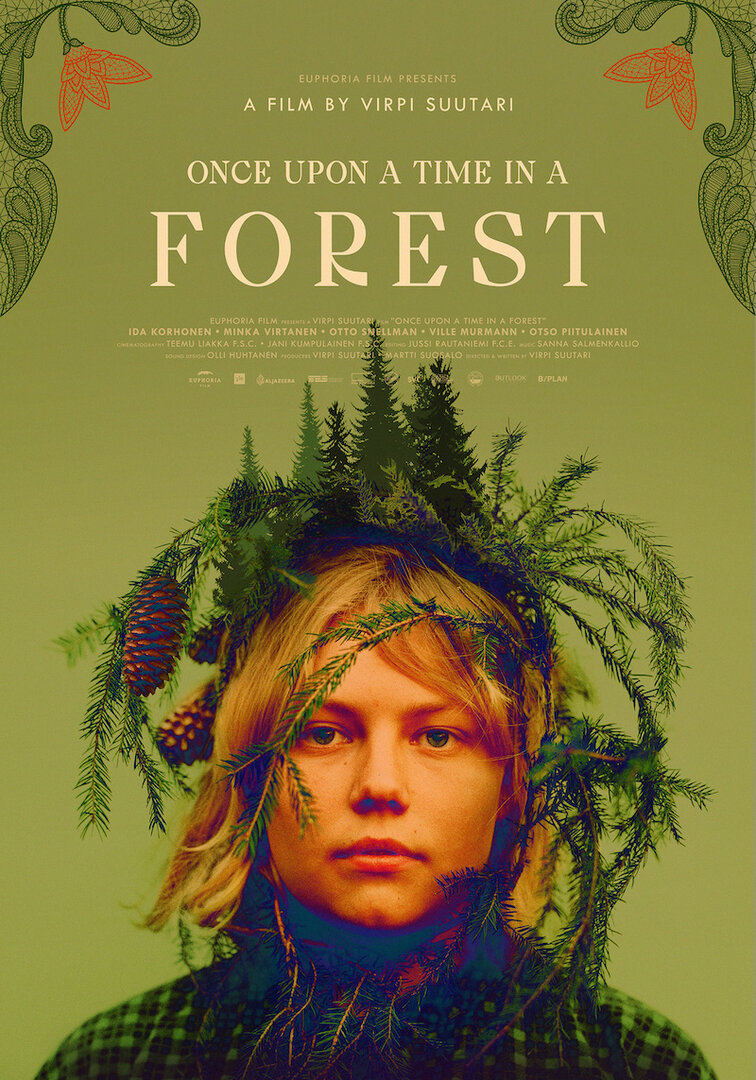
Copy Paste of the press release tonight from the festival:
“La Jetée, the Fifth Shot” by Dominique Cabrera Triumphs with the Golden Dove at DOK Lepzig’s International Competition Documentary Film
Long animated film “Pelikan Blue” receives Golden Dove | Long film “Tarantism Revisited” wins the German Competition | Audience jury honours “Once upon a Time in a Forest”
The award winners of the 67th edition of DOK Leipzig have been announced. Seven Golden Doves, two Silver Doves, and various Partnership Awards were presented during two ceremonies at the Schaubühne Lindenfels in Leipzig on Saturday.
In the International Competition Documentary Film, the Golden Dove Long Film went to Dominique Cabrera for “La Jetée, the Fifth Shot” (Le Cinquième plan de La Jetée | France). The festival had also dedicated a homage to the director this year. In the award-winning film, Cabrera’s cousin recognises himself in Chris Marker’s classic short film “La Jetée” (1962), prompting an exploration of the family’s history.
“With precision and a light touch, the filmmaker takes us on an intimate journey …, revealing new layers of meaning and emotion behind an enigmatic image of a boy and his family,” the jury said in its statement. The 10,000-euro Golden Dove is sponsored by Mitteldeutscher Rundfunk. The award was presented by Jana Brandt, the director of the MDR Programme Directorate Halle.
The 3,000-euro Golden Dove Short Film went to celebrated British experimental filmmaker John Smith for “Being John Smith” (UK), a wry look at how having one of the most generic names in the English language has affected his life and career. The jury was impressed by Smith’s “willingness to share doubts and vulnerability” and “questions about what makes up our identity”.
The films that have earned Golden Doves in the International Competition Documentary Film qualify for nomination for the annual Academy Awards®, provided they meet the Academy’s standards.
The Silver Dove Long Film, sponsored by 3sat and awarded to the best feature-length documentary film by an up-and-coming director, went to Pierre Michel Jean for “Twice Into Oblivion” (L‘oubli tue deux fois | France, Haiti, Dominican Republic). The film deals with was known as the Parsley Massacre of 1937, which ended the lives of 20,000 Haitians living in the Dominican Republic. “By pursuing two distinctly compelling modes – testimonials from elderly survivors as well as improvisational performances by the young inheritors of these unhealed wounds – the film shows the persistence of the past, and the need to reckon with it in order for us to find a way forward,” the jury stated in praise of the film. Johannes Dicke, the head of programming at 3sat, presented the 6,000-euro award to the filmmaker.
The 1,500-euro Silver Dove Short Film, sponsored by the independent Saxon State Media Agency (SLM) and awarded to the best short documentary by an up-and-coming director, went to “What Goes Up”(Saudi Arabia, USA) by Samar Al Summary. In this film, the artist trampolines at a military airfield in Arizona – rebelling not only against gravity, but also against the patriarchy. The jury remarked: “Beginning with her own impossible return, the filmmaker invents a language to unearth the stories of others who left their own fragile traces in the landscape.” The award was presented by Thomas Neie from the SLM’s Media Council.
The winners of the International Competition Documentary Film were selected by Maria Bonsanti, Sylvaine Dampierre, Mark Edwards, Eric Hynes, and Avi Mograbi.
In the International Competition Animated Film, the 3,000-euro Golden Dove Long Film went to László Csáki for “Pelikan Blue” (Kék Pelikan | Hungary), about three broke friends in Hungary who forge train tickets to travel to the West after the fall of communism. “While we do not condone forging your way towards your dreams, we absolutely appreciated the manner in which the story was told, the visual language and, above all, the effortless personal and historical honesty it embraced,” the jury said.
The Golden Dove Short Film, which includes 1,500 euros, sponsored by the German Institute for Animated Film e. V. (DIAF), went to Anu-Laura Tuttelberg for “On Weary Wings Go By” (Linnud läinud | Estonia, Lithuania). In the film, a miniature girl made of delicate porcelain observes the onset of winter. “The boundary between the characters and the real environment gradually dissolves into an ambivalent world full of wonder and visual poetry, in which nature itself seems to be the protagonist,” the jury said. Dr. Volker Petzold (Chairman of the DIAF) addressed the audience at the award ceremony.
The film that earns the Golden Dove Short Film qualifies for nomination for the annual Academy Awards®, provided it meets the Academy’s standards.
Jury members Merlin Flügel, Isabel Herguera, and Nosipho van den Bragt gave a Special Mention to Heinrich Sabl for “Memory Hotel” (Germany, France).
In the German Competition Documentary Film, the Golden Dove Long Film went to “Tarantism Revisited” (Germany, Switzerland) by Anja Dreschke. The directors investigate the phenomenon of “tarantism”, which made numerous women in southern Italy in the 1950s dance uncontrollably, supposedly from the bite of a poisonous spider. “The myth repeats itself, always the same and always different, in the bodies that rebel against the poison of a patriarchal order by dancing or face the toxic legacy of exploitative land use. Between archival research and re-enactment, sound and text compositions, gender and genre, this film develops an idiosyncratic language, resistant in the best sense of the word,” commended the jury. This 10,000-euro award is donated by Doris Apell-Kölmel and Michael Kölmel.
The Golden Dove Short Film, which includes 1,500 euros, went to Leonard Volkmer for “The King of Spain” (Der König von Spanien | Germany), in which the director’s search for his own past takes him from Berlin darkrooms to clubs in the Spanish capital and into the archives of a provincial psychiatric ward. Jury members Tilman König, Katrin Mundt, and Susanne Sachsse noted that the film “confides personal matters in us and makes them cinematically tangible – not as illustration, but as a daring venture.”
The Golden Dove in the Audience Competition was presented to the documentary film “Once upon a Time in a Forest” )Photo) (Havumetsän lapset | Finland) by Virpi Suutari. In this film, an environmentalist takes on the Finnish forestry industry. “Despite the urgency of climate change, the film takes the time to immerse itself in the magic of nature. The intimate portrait of the protagonists has touched and inspired us deeply,” emphasised jury members Linda Dombrowski, Maria Gallo, Sophie Görlipp, Maria Weiße, and Anna Wulffert. The 3,000-euro award is granted pro rata by the Leipziger Gesellschaft zur Förderung der Filmkunst e. V.
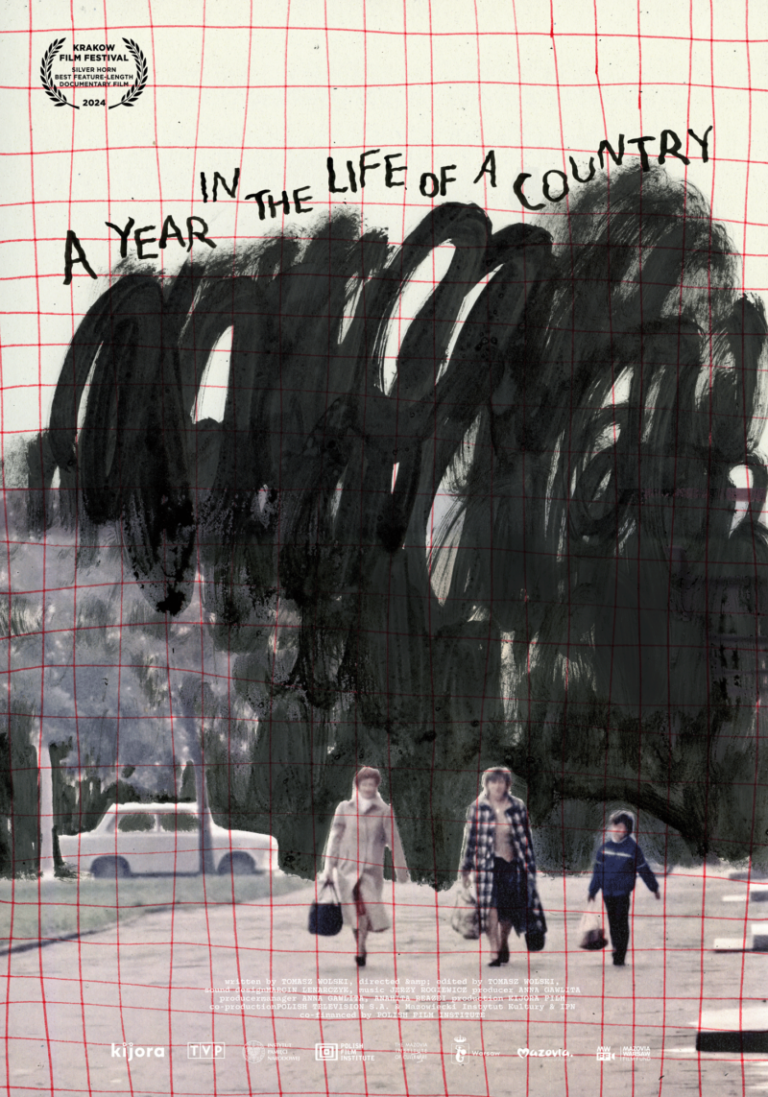
Tomasz Wolski was a child when Jaruzelski introduced Martial Law in December 1981. I am from 1947 so I followed from a neighboring country what happened. From a distance. With Jaruzelski as the bad guy and Lech Walesa the good one, who stood behind

and was arrested several times, also during the martial law, of course. But that it can be interpreted and shown as Wolski does in his new film, I had no idea before watching another great archive-based documentary by a director, whose – a couple of them (“1970” and “An Ordinary Country”) – films have been mentioned/reviewed on this site; and praised for their strong narration and focus on the consequences of politics on the life of ordinary citizens. There are several sequences, where Poles express their point of views that it was a good decision to install the martial law in a situation, where the country was close to have a civil war – and you see – Wolski is a master in finding footage that are absurd and funny without pointing fingers at those involved… for instance a sequence where people stand in queues to buy chicks to secure – at a later stage – good deliveries of eggs. A scoop also it is that he has the television speech footage of the General in uniform, who is interrupted to make another take, far from the edited version that came to Danish television as I remember it. BUT BUT – and here Wolski shows his editing skills and extraordinary use of Jazzy music, fantastic choice – the last part of the film demonstrates the escalation of violence from the side of the military and the police with tanks and water cannons and gas sprayed into the eyes of the demonstrators, many being beaten up. Total brutality as we have seen it before and after, now in the streets of Tbilisi in Georgia. Let me give the floor to the director:
“Martial law is one of the most traumatic events in Polish history. To this day, it divides Poles over whether the Soviet Union would have intervened to quell the rising revolutionary sentiments. It managed to halt transformations, silence Solidarity for a few years, and allowed the communists to retain power. In A Year in the Life of the Country, I examine the 12 months of martial law, a period that, from today’s perspective, can seem both amusing and terrifying. I observed how people tried to function during that time and how we were already divided.”
Great film!
Poland, 2024, 85 mins. Awarded in Krakow, playing in Jihlava and Leipzig right now.